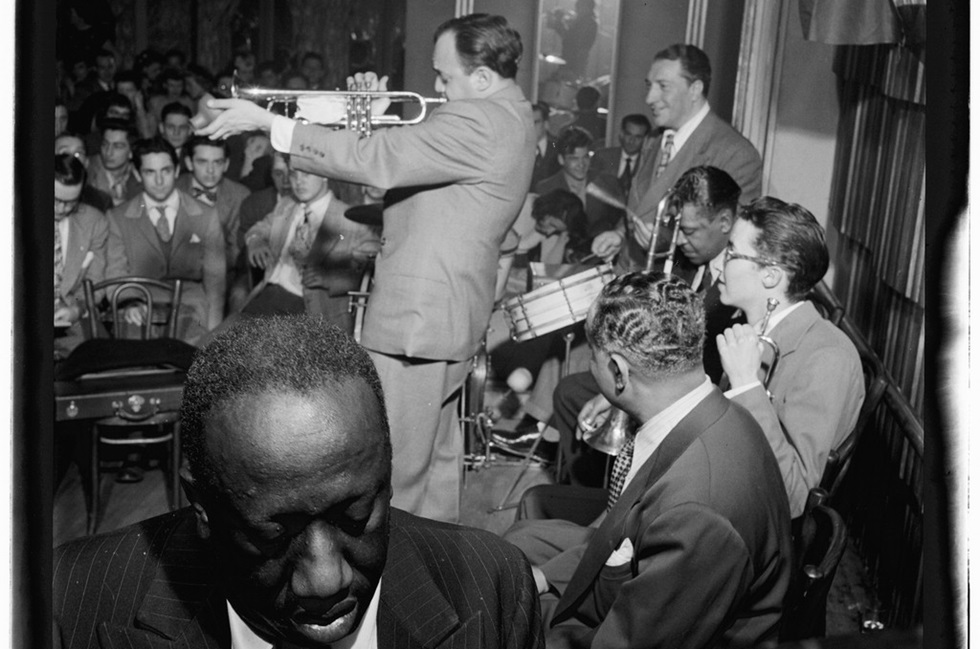
James P. Johnson (1894-1955), known as the “Father of the the Stride Piano” and a noted jazz composer and performer, also turned his talents in the late 1930s to writing opera. Perhaps he’d been inspired by the Gershwins’ Porgy and Bess, feeling that as an African-American he was just as well suited, if not more so, to writing about Black characters for the operatic, or musical theater stage, in a more authentic idiom.
Naxos has just dropped on the world a revelation of what authentic Black opera could look and sound like, with one complete short opera, De Organizer, just 32 minutes long with a libretto by Langston Hughes (1902-1967), and scenes from a longer opera, The Dreamy Kid, with, surprisingly, a libretto by famous playwright Eugene O’Neill (1888-1953), who by or around 1937, the date of this opera, had already won the Nobel Prize in Literature. Both operas were found in a state of disorganization and confusion, and have been lovingly reconstructed by musicologist James Dapogny.
The recordings date from performances in March 2006, with recording sessions that May, at the University of Michigan in Ann Arbor, the University of Michigan Opera Theatre conducted by Kenneth Kiesler. After some years’ delay, Naxos issued the 66-minute recording in 2023.
Academics and general readers were taken by surprise at the depth and scholarly expertise on evidence in historian Robin D.G. Kelley’s prize-winning monograph Hammer and Hoe: Alabama Communists during the Great Depression. The book traced the movement to organize and unionize both Black and white sharecroppers, a drive led by local Black Communists. De Organizer focuses on exactly that period, and with a text by the at least sometime Communist Langston Hughes, it was bound to pack quite a punch, although the only known performance of the work took place at the 1941 convention of The International Ladies Garment Workers Union.

The opera brings out the impulse toward unionization that came directly from the federal government during the New Deal era, though the emphasis was more on industrial than agrarian organizing. And if the New Deal brought other benefits, such as Social Security, there, too, Southern agricultural and domestic workers, mostly Black, got left out. The Chorus recites its existential dilemma:
Plowin’, plantin’, hoein’!
Gettin’ up early in de mornin’.
Plowin’, plantin’, hoein’!
Out in de fields at dawnin’.
Always watchin’ cotton growin’.
Plowin’, plantin’, hoein’!
Wonder where that cotton’s goin’?
Plantin’, plowin’, hoein’!
Wonder where my life is goin’?
Plowin’, plantin’, hoein’,
Wonder where my life is goin’?
With an understanding of that limited consciousness, Hughes focuses on the economic exploitation lying behind the unionization effort. He has a character named Dasher (Emery Stephens) begin to sketch out a vision of a different kind of future from this present life where workers have “nothing to lose but their chains” and a lifetime of inevitable suffering as depicted in the original version of Showboat’s “Ol’ Man River” is not the only way to face the world:
Just poor sharecroppers, yes!
But we ain’t gonna be always.
We gonna get together
And end these hongry days.
Folks, l’ve got them hongry blues—
And nothin’ in this world to lose.
People’s tellin me to choose
’Tween dyin’,
and lyin’,
and keepin’ on cryin’—
But I’s tired o’ them hongry blues.
Listen! Ain’t you heard de news?
There’s another thing to choose:
A brand new world, clean and fine,
Where nobody’s hongry and
There’s no color line!
A thing like that’s worth
Anybody’s dyin’—
Cause I ain’t got a thing to lose
But them dog-gone hongry blues!
And in an aria sung by De Organizer’s Woman (Monique Spells), as the assemblage in a secret night meeting in a barn await De Organizer’s arrival, Hughes shares the Marxist theory of surplus value in clearly understandable language:
He’s gonna help us build a union,
Build it of white and black,
Cause de people that works in de fields all day
Is tired of de landlords on our back….
Folks, I bring you leaflets!
Folks, read ’em well.
This little bit of paper here’s
got a lot to tell.
It says:
Ten thousand bales of cotton to de landlord!
How much was ours?
Ten thousand acres of cane to de big boss!
How much was ours?
A million water melons on de market!
How much was ours?
How can we get them things
That should be ours?
Here, take this little leaflet, folks,
And read it well.
This little bit of paper’s got
A lot to tell.
When De Organizer (Darnell Ishmel) finally shows up, having taken a circuit route to get there, he asks the crowd what they’re gonna do? They respond, “Get mad! Get mad!”
But De Organizer has a better way:
Folks, that ain’t de way!
Folks, that ain’t right.
The way to get what we all need’s
Unite! … Unite!
You don’t get mad at de rain, do you?
You don’t get mad at de sun?
Ain’t no use to get mad then
At a big boss with a gun!
De rain you stores in cisterns.
De sun gives de berries their juice.
De union can rake any old boss
And turn him every way but loose!
When we got a big strong union, folks,
A union of black and white,
There’ll be more difference in this old South
Then there is twixt day and night.
So to organize is right!
An Old Man (Kenneth Kellogg), who in the late 1930s might have been born into slavery or certainly would have had enslaved parents, philosophizes:
Well, when de meetin’s underway,
I has a word to say. And it is this:
The sooner we on this plantation organizes,
the better, because the way things is going now,
if we don’t organize, we is gwine to get put off.
and if we get put off we’s got no place to go,
and no work, and to get relief is hell, and I
don’t want relief nohow! I likes to work, so
let’s get together and organize and perfect ourselves
and these here fields and this here state
and our country, because…
At this point the Old Man’s reverie about the future is interrupted by loud gunshot heard outside. It’s the Overseer (Branden C.S. Hood) intimidating the gathering. After being lectured by the union members, the Overseer has to admit
You-all say freedom?
Don’t look at me.
I work for the landlord, too.
I ain’t free!
And the crowd ends the opera celebrating that “We organized a union here tonight!”
De Organizer has eight principal singers, chorus and orchestra, and a tuneful, highly accessible score with many echoes of Southern choral hymn-singing.
The Dreamy Kid is a four-character mini-drama, offered here as “excerpts,” though how much more was contemplated is not known. There is enough, however (33 minutes), to make a stageworthy event of the restoration. Mammy Saunders (Elizabeth Gray) is on her deathbed and semi-delirious. She raised her grandson Dreamy (Lonel Woods) as her own. Dreamy’s girlfriend Ceely Ann (Lori Celeste Hicks) is waiting for Dreamy to arrive, on a promise that he would not abandon his Mammy, while Irene (Olivia Duval) warns Dreamy of the impending danger he’s in. It seems that Dreamy has been involved in a fight where a white man has been killed, and knows the police are after him. At the end of the opera footsteps are heard on the stairway and it is evident that they have tracked him down. As Mammy dies, comforted by Dreamy’s last prayer at her bedside, it is clear he is also uttering a prayer for his own soul. The police will certainly shoot to kill, unless he cheats them of the opportunity by taking his own life first.
In such plays as The Emperor Jones and The Hairy Ape O’Neill approached Black American life with his own version of vernacular writing. Although some have criticized him for “appropriating” the Black experience—Paul Robeson eventually gave up performing these roles—Johnson apparently still felt drawn to O’Neill for his libretto, a word-for-word setting of a play first written in 1918. Most of it is dialogue, set to music, of course, with at least one major aria, a kind of recollected lullaby, for Mammy:
Dreamy oh Dreamy when you grows to manhood,
you’ll have a wife and some kids like a man should,
but for the present you’ll sho’ have to sleep good.
Dreamy dreamy, time. Dreamy dreamy time.
You’ll grow up maybe and still be my baby, sleepy sleep
Dreamy time.
With Johnson’s sure command of instrumental and vocal forces, these are two, albeit short important contributions to African-American opera, certainly worthy of being professionally produced and introduced to a wider public.
The program notes by Cody M. Jones are illuminating, as are the recollections of James Dapogny (1940-2019) about his restoration work.
James P. Johnson
De Organizer and The Dreamy Kid
American Opera Classics
Naxos 8.669041
2023
We hope you appreciated this article. At People’s World, we believe news and information should be free and accessible to all, but we need your help. Our journalism is free of corporate influence and paywalls because we are totally reader-supported. Only you, our readers and supporters, make this possible. If you enjoy reading People’s World and the stories we bring you, please support our work by donating or becoming a monthly sustainer today. Thank you!












Comments